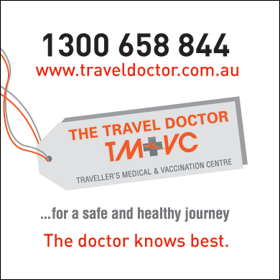Eat, drink and be careful
Many travellers rate eating and drinking one of the most enjoyable aspects of travel. However, food and water can be contaminated in a variety of ways and Travellers’ Diarrhoea is common particularly in hot countries. To minimize the risks of food and water borne diseases, the Travel Doctor-TMVC National Medical Advisor Dr Tony Gherardin, offers a number of simple precautions:
- Personal hygiene should be meticulous; bacteria can be carried to the mouth on hands and cutlery. Always wash your hands before eating and avoid putting fingers and thumbs anywhere near your mouth;
- Be selective in what you eat and drink. You cannot avoid risk altogether, but you can at least avoid the obvious sources of trouble;
- You have any doubts about the water available for drinking, washing food or cleaning teeth, boil it, use water-disinfecting tablets or use bottled water in sealed bottles. Hot tea or coffee is usually safe as is wine, beer and carbonated soft drinks;
- Do not add ice to your drinks unless absolutely certain that it is made from purified water.
- Do not drink unpasteurised milk unless it is boiled. Also avoid ice cream from unreliable sources, such as kiosks or itinerant traders;
- Eat freshly cooked , piping hot food, do not eat uncooked, undercooked food or reheated food;
- Avoid salads and unpeelable fruit and vegetables;
- Fish and seafood can be suspect in some countries, oysters, clams, mussels, barbecued prawns or mudcrabs are a particular hazard.
A recent study showed that within 48 hours of leaving home:
| 47% |
| 49% |
| 53% |
| 23% |
Traveller’s Diarrhoea
Everyone seems to have a favourite traveller’s diarrhoea story. The Mexican Two Step, Bali Belly, the Rangoon Runs; it almost sounds fun! But don’t be fooled. While it may seem funny in the retelling, traveller’s diarrhoea is the most common cause of spoiled holidays or business trips, and it is anything but funny at the time. The cause is contaminated food and water. There are three types of problems, and these are important to distinguish because they have different causes and different treatments.
Common Travellers Diarrhoea
This is the one most travellers to developing countries experience sooner or later, with watery diarrhoea and sometimes vomiting. It is caused by bacteria, such as E.coli, Campylobacter, Salmonella and Shigella. It is treated with rehydration, and if persistent, with an antibiotic called norfloxacin.
Giardia
This protozoan is found in tap water in many cities around the world, as well as river water and contaminated food. Giardia can drag on and on, sometimes long after returning home. Cramping stomach pain, belching, wind; all round Giardia doesn’t make the sufferer very pleasant company! It requires treatment with a different antibiotic called tinidazole.
Dysentery
This is the severe end of the spectrum, with blood or mucus in the motions. Bacterial dysentery will usually improve with norfloxacin. Amoebic dysentery will not respond to norfloxacin but may respond to tinidazole. Dysentery can be a real medical emergency while travelling, and needs medical follow up on return home.
The Travel Doctor-TMVC advises all travellers to higher risk destinations take treatment for traveller’s diarrhoea with them, such as a specially designed Travellers’ Medical Kit. The most important aspect of treatment is rehydration. You must replace the fluids and salts that are lost from the body. Not eating for a day does not matter so much, but if you do not drink you can become very unwell quickly, especially in a hot country. Drink at least 3 litres of fluid a day. The Travel Doctor recommends bottled water with ORS (Oral Rehydration Salts) Gastrolyte correctly added. More detailed information is contained in “A Health Guide for International Travellers” a Travel Doctor-TMVC publication available free of charge with a consultation with the Travel Doctor-TMVC.


